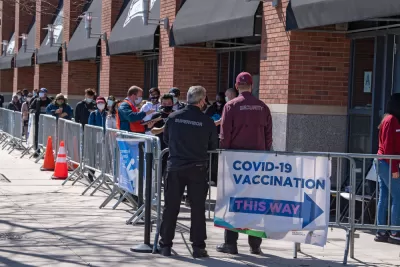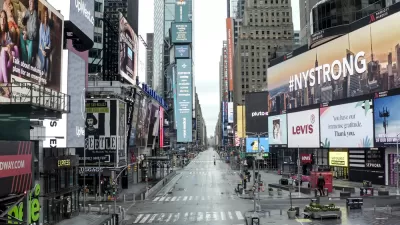The latest edition of an ongoing compendia of articles trying to make sense of the deep uncertainties of the pandemic—and what it all means for the future of cities.

On a few occasions since I started compiling these compendia of articles on the potential of the pandemic to influence the future direction of planning and development, I've allowed myself the smallest of hopes that there would soon be no reason to write about the pandemic in the present tense, and that the uncertainties of the pandemic would be replaced by a common purpose.
Uncertainty is really at the root of all the analysis, reporting, and commentary over the past year. We could only speculate, and we are still are, about the consequences of the pandemic's disruption of the daily lives of every human on the planet. Every day, week, and month, these compendia piled up:
- 'Never Let a Good Crisis Go to Waste' and Planning in the Pandemic (March 2021)
- Haves and Have Nots: Planning and the Deep Divides of the Pandemic (February 2021)
- Density Takes Center Stage in the Pandemic, Again (January 2021)
- Nine Months Later: How the Pandemic Is Changing Communities (December 2020)
- Coronavirus and the Future of Cities: A Final Pre-Election Tour of the Issues (November 2020)
- Do We Know Any More About the Future of Cities Than We Did in April 2020? (October 2010)
- The Media Can't Stop Talking About the End of Cities (August 2020)
- The Great Debate: Will the Pandemic Alter the Course of Urbanism? (July 2020)
- Debating the Future of Cities After the Coronavirus, Volume 3 (June 2020)
- Density Debate Rages Alongside the Pandemic (April 2020)
- Debating the Future of Cities, and Urban Density, After the Pandemic (March 2020)
- Coronavirus and Urbanism (Planetizen Tag)
- Coronavirus and Transportation (Planetizen Tag)
- Coronavirus and Density (Planetizen Tag)
But over the past month or so, as vaccination rates have far outpaced infection rates, knowns are replacing unknowns.
Based on my unscientific and admittedly biased observations, more writers and media outlets are speaking in certain terms. Instead of talking about what's possible, more are willing to state confidently what's happened and what's happening. The shift in tone would seem to add at least a few lumens to that light shining from the end of the tunnel—or so I have allowed myself to hope occasionally while putting together this most recent issue of the pandemic planning compendium.
But light at the end of the tunnel can't be allowed to distract from the brutal reality that the consequences of the pandemic will continue to be a crisis for many in this country and around the world. It has to be said: even with that light at the end of the tunnel shining close enough for some in the United States to see it with their eyes and feel it on their skin, the consequences of the pandemic could leave the world far worse off than it would have otherwise been. Failing to address the crises of climate change, racial inequality, the growing wealth gap, and increasing homelessness (or, you know, preparing for the inevitable next pandemic) in the post-pandemic era will ensure that the traumas and failures of the pandemic last in this world far beyond the not-so-novel coronavirus.
Some of the themes emerging from this month's compendium should cause some concern that the media and the public are in danger of missing or forgetting some of the lessons of the pandemic. When I squint, the majority of the planning- and development-related articles I found on the pandemic over the past month seem less concerned about cities and people than commerce and real estate. As with so many dynamics in the country, the difference is as significant as the difference between an individual and a community. For a while there, the pandemic forced a new kind of conversation about what it means to live in a society—even if people were jockeying for position from far different ideologies about what shape society should take in the future. According to my, again, unscientific and biased observation, the conversation that has taken place in these first few moments of optimism about the end of the pandemic seems more focused on a single, solitary bottom line.
That's all a rambling way of saying the work of learning and recovering from the pandemic has only just begun. The uncertainties are still there, and though they might not be as novel and frightening as they once seemed, they still represent a catastrophic emergency. Millions, perhaps billions, of lives still hang in the balance. Housing, transportation, infrastructure, and education will all play a central role in the world to come, just like they always have. The question of whether we've learned anything about how to a mutual prosperity is still very much up for debate.
Post-Pandemic Planning
- In some cities, the pandemic’s economic pain may continue for a decade (Brookings, March 11)
- The path to the post-Covid city (Financial Times, March 12, 2021)
- Adaptive Public Space: Places for People in the Pandemic and Beyond (Knight Foundation, March 24)
- What if Working at Home Makes Us Drive More, Not Less? (Slate, April 7)
- Editorial: After the pandemic, outdoor dining and ‘slow streets’ should live on (Los Angeles Times, April 11)
- Why New York May Emerge From Covid Richer Than Ever (Bloomberg, April 12)
- A better way to plan the post-pandemic Puget Sound (Crosscut, April 12)
- What We Learned After Analyzing 5 Months of Active Mobility Responses to COVID-19 (CityFix, April 12)
- A year into the pandemic, it’s even more clear that it’s safer to be outside (The Washington Post, April 13)
- Informal Transport Must Play a Bigger Role in Post-Pandemic Recovery. Here’s How That Can Happen. (City Fix, April 15)
- Forecasting Future Urban Trends (National League of Cities, April 15)
- COVID-19 devastated public transit, and underscored how indispensable it is (Rice University Kinder Institute for Urban Research, April 19)
Housing Before, During, and After
- To escape the pandemic and lockdowns, Californians resettle in Taiwan (Los Angeles Times, March 23)
- What the Great Recession can teach us about the post-pandemic housing market (Brookings, March 29)
- COVID vaccinations give Americans more confidence in housing (Inman, April 7)
- How Have Renters Responded to Financial Stress in the Pandemic (Joint Center for Housing Studies of Harvard University, April 8)
- Borrowers locking in mortgages for second homes surged 128% (Inman, April 8)
- The dispiriting housing boom (Axios, April 11)
- Cash-Strapped Renters Hit Hard by Pandemic (MReport, April 12)
- Billions in Covid-19 Aid Is Slow to Reach Renters and Landlords (The Wall Street Journal, April 13)
- Baby Boomers, Isolated During Covid, Rushed to Move Close to Their Kids (Wall Street Journal, April 14)
- Hundreds of thousands of homeowners exit forbearance as economy improves (Houston Chronicle, April 15)
- Could Bay Area home building be a COVID long-hauler? (The Mercury News, April 19)
- How the Pandemic Did, and Didn't, Change Where Americans Move (The New York Times, April 19)
- How construction in 5 'mini megacities' fared during the pandemic (Smart Cities Dive, April 19)
Work, Work, Work
- After Pandemic, Shrinking Need for Office Space Could Crush Landlords (New York Times, April 8)
- The Right Way to Rebuild Cities for Post-Pandemic Work (Bloomberg CityLab, April 9)
- Salesforce to reopen S.F. headquarters in May, starting with vaccinated workers (San Francisco Chronicle, April 12)
- Telecommuting will make Boston share the wealth (The Boston Globe, April 15)
- What Will Happen to All the Empty Office Buildings and Hotels? (The New York Times, April 16)
- The pandemic changed the workday, but will transit riders return? (The Washington Post, April 16)
Disparate Impacts
- Covid Has Made Where You Live Matter Even More (Bloomberg, April 5)
- Some New Yorkers Don’t Want the Superrich to Return (The New York Times, April 15)

Planetizen Federal Action Tracker
A weekly monitor of how Trump’s orders and actions are impacting planners and planning in America.

Congressman Proposes Bill to Rename DC Metro “Trump Train”
The Make Autorail Great Again Act would withhold federal funding to the system until the Washington Metropolitan Area Transit Authority (WMATA), rebrands as the Washington Metropolitan Authority for Greater Access (WMAGA).

The Simple Legislative Tool Transforming Vacant Downtowns
In California, Michigan and Georgia, an easy win is bringing dollars — and delight — back to city centers.

Supporting Cycling Takes More Than Just Bike Lanes
Safe, protected bike lanes are a key part of a city’s bike infrastructure — but secure parking, e-bike charging, and other amenities can also influence people’s shift to cycling.

Judge Blocks Anti-DEI Rules for Transportation, Housing Grants
A second injunction blocks the Trump administration from enforcing new regulations for federal funding.

Unhoused People in San Jose Could Face Arrest if They Refuse Shelter
A policy proposed by the city’s mayor would give law enforcement the option to arrest homeless residents if they refuse three offers of housing.
Urban Design for Planners 1: Software Tools
This six-course series explores essential urban design concepts using open source software and equips planners with the tools they need to participate fully in the urban design process.
Planning for Universal Design
Learn the tools for implementing Universal Design in planning regulations.
Smith Gee Studio
City of Charlotte
City of Camden Redevelopment Agency
City of Astoria
Transportation Research & Education Center (TREC) at Portland State University
US High Speed Rail Association
City of Camden Redevelopment Agency
Municipality of Princeton (NJ)






























